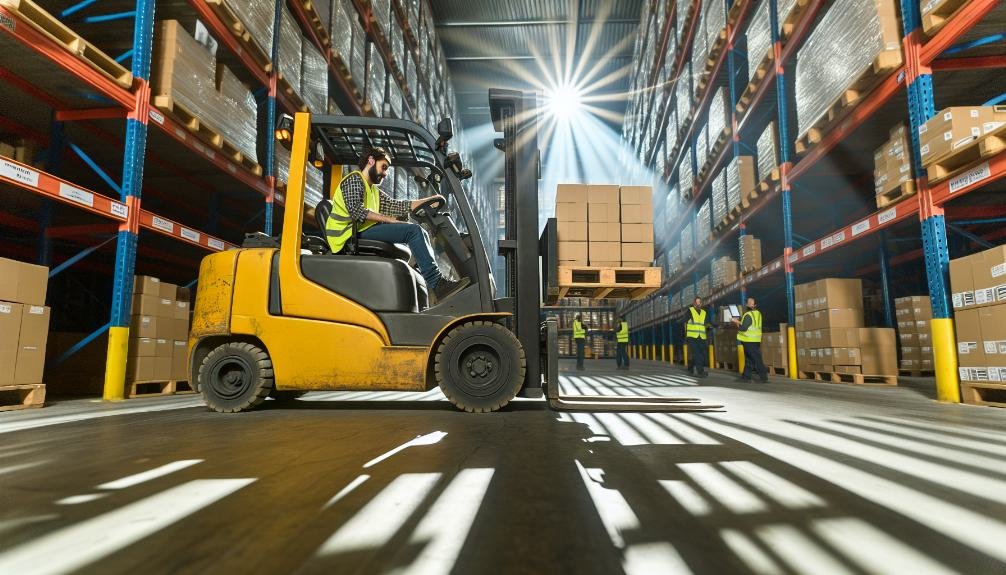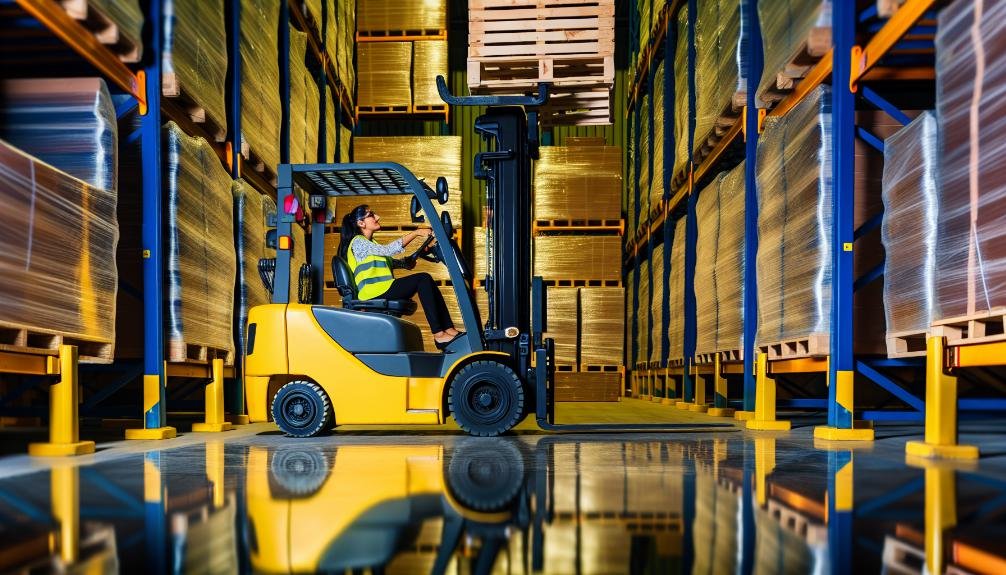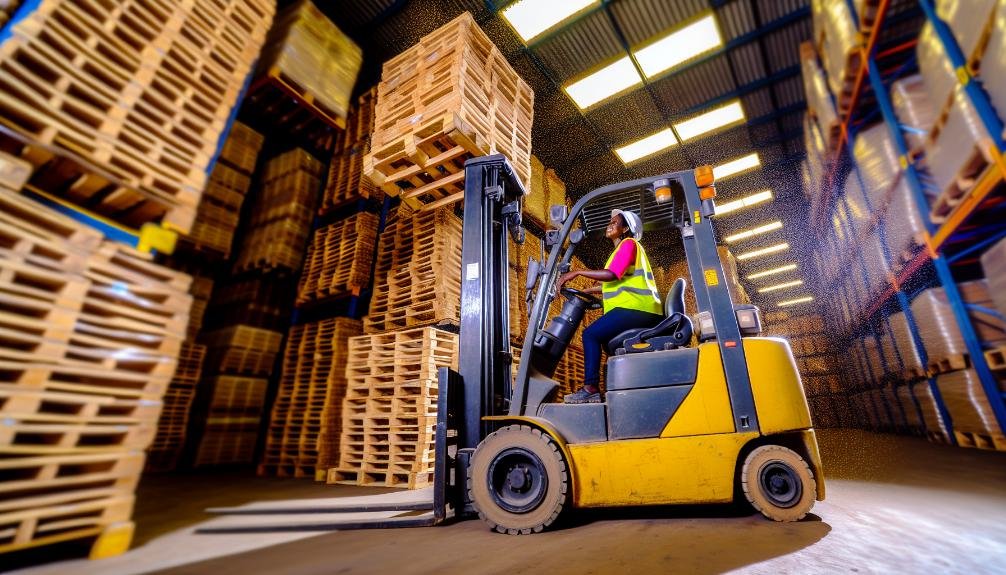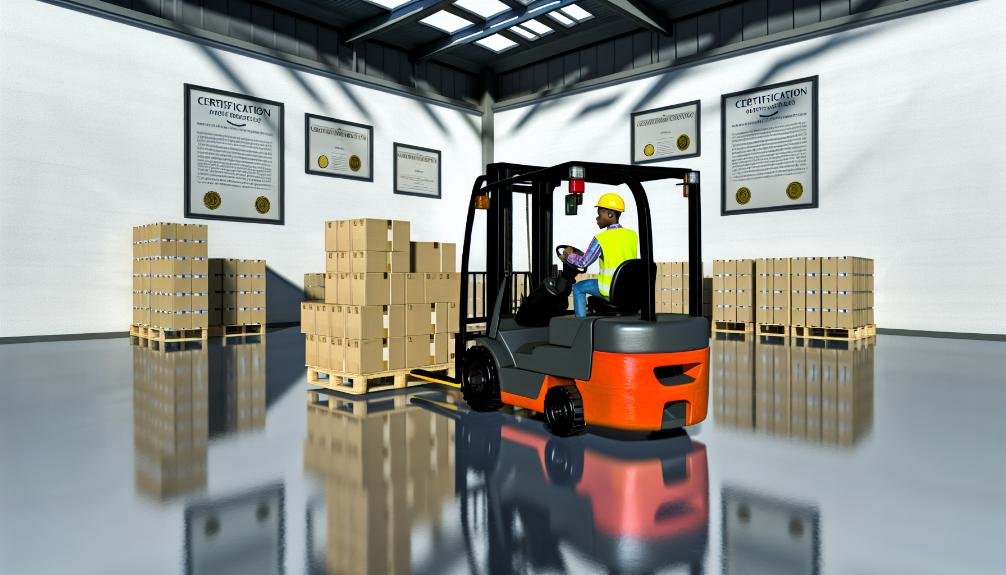Consider if the role of forklift operator is truly just about driving a machine from point A to point B. As a forklift operator, you'll find there's more to the job than merely moving things around. You'll be responsible for precise inventory management, ensuring safety on the floor, and thorough equipment inspections. But how can you build these essential skills, and what do you need to start a career in this field? Discover the nuances of this vital role, and see why your attention to detail is as important as your driving skills.
Key Responsibilities

As a forklift operator, embracing the core responsibilities is essential for guaranteeing seamless warehouse operations. You play a pivotal role in handling the transportation and storage of raw materials and products, tasks that are foundational for supporting job growth in the logistics sector. By efficiently loading, unloading, and moving items, you align with the latest industry trends emphasizing speed and accuracy in delivery services. Keeping accurate inventory records and maintaining an organized storage environment bolster operational efficiency, allowing for swift adaptation to fluctuating production schedules. Prioritizing safety and compliance not only protects your work environment but also guarantees sustained productivity. Your strategic contribution to the logistical support framework prepares the organization for evolving demands, reinforcing your integral position within a dynamic industry landscape.
Essential Skills
To thrive as a forklift operator, you need a combination of proven forklift experience and a sharp attention to detail, which guarantees both safety and efficiency. A valid certification not only validates your competency but also enhances your ability to manage complex tasks with compliance in mind. Conducting pre-operation checks ensures the forklift's readiness and prevents accidents, further underlining the importance of adherence to safety protocols. Strategically honing these skills will position you as a critical asset in maintaining seamless operations.
Proven Forklift Experience
Adept forklift operators are pivotal to ensuring operational efficiency in any warehouse setting. Your ability to operate heavy machinery with finesse not only promotes efficiency but also enhances forklift safety. Possessing a valid forklift operation certification underscores your expertise, allowing you to handle complex situations strategically. Your experience with RF scanning equipment and knowledge of operational safety empower you to manage inventory efficiently and safely navigate bustling environments without compromising safety protocols. You maintain exceptional operator efficiency through your understanding of mechanical systems, enabling you to perform necessary maintenance and inspections. Regular maintenance and inspections on forklifts are crucial to keep the machinery in optimal working condition and prevent potential safety hazards.
Attention to Detail
Attention to detail embodies the essence of operational success in forklift operation—a essential skill that fortifies safety and precision in warehouse environments.
By emphasizing rigorous load inspection, you guarantee every item is secure and free from damage before transport. This minimizes accidents, aligning with safety regulations and preserving your efficiency.
Equipment checks are fundamental; they verify that forklifts meet operational standards, reducing unexpected downtime and enhancing productivity. As a forklift operator, you must be proficient in operating forklifts and other material handling equipment, ensuring efficiency in handling all tasks.
Your role demands vigilance in identifying hazards and managing loads according to weight capacities.
Accurate goods handling requires precision in placing and retrieving items, preventing disruptions in workflow.
Mastering these details boosts your strategic maneuvering in tight spaces, further refining operational balance and enabling seamless, productive warehouse operations.
Valid Certification Required
Obtaining a valid certification is vital for any forklift operator aspiring to maintain a high standard of safety and efficiency in the workplace. The certification process requires you to be at least 18 years old and involves thorough training to guarantee you meet specific training requirements. This includes formal instruction on operation specifics, safety precautions, and practical training under skilled supervision. It is essential that operators receive hands-on training and performance evaluations by their employer following course completion to ensure skill proficiency. To uphold proficiency, certifications must be updated every three years, necessitating additional training programs. It's important that you're certified for the specific class of forklift you operate and that you keep proof of your certification readily available. Employers hold the responsibility to promote continuous compliance with OSHA regulations and workplace safety standards, fostering a secure work environment for everyone involved.
Job Requirements

While becoming a forklift operator might seem straightforward, obtaining a job requires meeting specific educational and technical benchmarks. The job outlook is promising, but to capitalize on this, possessing a high school diploma or GED is fundamental.
A valid forklift certificate enhances your salary expectations and increases job prospects. Consider specialized training or apprenticeships that offer hands-on experience and classroom learning to boost employability. It's crucial to have technical skills to optimize loads and ensure the efficiency of operations.
You'll also need to demonstrate proficiency in machinery operation and RF scanners, while maintaining excellent hand-eye coordination. Physical endurance is vital for handling long shifts.
Understanding load capacities guarantees safe operations, and familiarity with various forklift models adds a strategic edge. Safety is paramount; adherence to OSHA regulations and preventive maintenance duties, like inspections and servicing, are non-negotiable.
Key Competencies
To thrive as a forklift operator, mastering certain key competencies is vital. A strategic focus on forklift efficiency and load management becomes essential to successful operations.
Begin by sharpening your technical skills in load handling. This entails inspecting items for damage, confirming load safety, and aligning forks methodically. Complying with safety protocols enhances both individual and team productivity, preventing mishaps. Additionally, it is crucial to understand that skilled operators are essential for efficient material handling in warehouses and distribution centers, which prevents significant disruptions in the logistics chain.
- Check your forklift's load capacity plate before operating.
- Communicate effectively with your team to maintain safety and efficiency.
- Inspect your equipment regularly and document any findings.
- Remain vigilant by maintaining a safe speed and distance.
These competencies guarantee you navigate tight spaces efficiently, manage loads safely, and adhere to safety standards, ultimately driving productivity and preventing accidents.
Operational Duties

Mastering operational duties as a forklift operator demands strategic attention to unloading and loading materials efficiently.
You'll encounter operational challenges that require precise stacking and storing of materials in assigned spots. Efficiently transferring cargo from delivery trucks to storage locations and relocating items within a warehouse or factory is key.
Your role isn't just mechanical; it's about workflow optimization. Transport raw materials to production workstations, ensuring smooth shifts for manufacturing processes.
Load and unload vehicles, and facilitate effective inventory management through careful labeling and sorting of shipments. Forklift operators are essential for maintaining efficiency and safety in operations, and they play a critical role in moving materials between storage areas, machines, and loading docks for a seamless operation.
Each action you take impacts the entire workflow and demands a resourceful approach to keep operations running smoothly.
Safety and Maintenance
Guaranteeing safety and maintaining efficiency as a forklift operator demands deliberate attention to detail.
Strategically fostering a safety culture involves adhering to forklift safety precautions and using personal protective equipment. Always observe load limits, keeping loads both stable and balanced. Avoid raising or lowering loads when moving, and maintain a safe distance from edges.
- Monitor other vehicles in the work area meticulously.
- Prioritize using horns at cross aisles and obstructed zones.
- Wear safety gloves during essential forklift maintenance tasks.
- Adhere to reflective vests for visibility.
Regular inspections are essential to identify worn or faulty equipment, as poor maintenance is a leading cause of forklift accidents. Resourcefulness is crucial in establishing and following effective maintenance schedules. Regular inspections and cleaning guarantee forklifts remain in peak condition.
Remove faulty vehicles and conduct necessary repairs based on manufacturer's guidelines. Proactively scheduling maintenance prevents mechanical failures, upholding safety standards.
Certification and Training

To effectively operate a forklift, you need essential certifications that adhere to OSHA requirements, including formal instruction and workplace evaluations. Engaging in ongoing safety training and specialized operation courses guarantees you maintain proficiency and legal compliance. Prioritizing certification reduces accidents linked to operator carelessness and promotes workplace safety, enhancing morale and productivity.
Essential Forklift Certifications
Although operating a forklift can seem straightforward, securing the necessary certifications is both a strategic requirement and a crucial safety measure.
Confirming certification validity and training effectiveness demands your proactive engagement in a structured process. You'll need to meet several key requirements:
- Age Requirement: You must be at least 18 years old.
- Training Completion: Finish a program meeting OSHA standards to certify your competence.
- Specific Class Vehicle Certification: Certify for the exact class of forklift you'll operate.
- Certification Update and Renewal: Stay proactive by renewing your certification every three years. Proper training significantly reduces workplace accidents, ensuring not only compliance but also the enhancement of operator confidence and productivity.
Employers play a significant role by providing training, monitoring your performance, and maintaining compliance with safety regulations.
Certification types vary, but each includes core elements designed to maximize your skillset and promote workplace safety.
Ongoing Safety Training
Securing the necessary certifications sets the foundation for responsible forklift operation, but maintaining safety and compliance requires ongoing commitment. You must engage in refresher training every three years to guarantee your skills remain sharp and aligned with current safety protocols. This not only boosts training effectiveness but also mitigates risks associated with outdated practices. When workplace environments or equipment change, additional refresher sessions become essential to adapt and avoid potential hazards. Mandatory evaluations by certified trainers offer hands-on insights, reinforcing your initial training. Certified operators improve overall productivity within the business, thereby adding value while ensuring safety standards are met. Staying updated with the latest regulations and company policies guarantees your actions reflect industry standards.
Specialized Operation Courses
Looking to enhance your forklift operation skills? Consider enrolling in specialized operation courses to master advanced maneuvering and specialized techniques. SC Training, a trusted provider, offers a free online course focusing on essential safety and operation elements such as pre-operation checks and hazard awareness. OSHAcademy provides a thorough, OSHA-compliant program exploring physics-based loading and safety precautions, with optional certification for a fee. The OSHA Education Center delivers a purely online pathway for certification, emphasizing formal instruction and hands-on training. Total Equipment Training combines safety insights with a practical skills test, ensuring readiness and compliance. Effective training programs are essential as they improve operator performance and efficiency, reducing equipment misuse and damage. Here's what you'll gain:
- Advanced maneuvering strategies
- Understanding of specialized techniques
- Compliance with recognized standards
- Enhanced safety and operational skills
Career Advancement Opportunities
Numerous pathways exist for forklift operators aiming to advance their careers. Effective advancement strategies include leveraging your experience to climb career pathways, such as evolving into supervisory roles. Moving into warehouse management requires strong leadership and logistics skills, overseeing operations, and managing inventory. With dedication, supervisory roles in warehouses and distribution can yield six-figure salaries. Consider specialization in handling specific materials to access niche roles with higher remuneration. Cross-training in warehouse management or inventory control enhances job versatility, opening more opportunities. Advanced sensors and cameras are being integrated into forklifts to enhance navigation, showcasing opportunities to transition into roles as a robot operator or technician. Technical roles like forklift technicians allow you to utilize your equipment knowledge in inspections and repairs. Alternatively, entrepreneurial pathways can be lucrative, with the potential for business ownership in industrial equipment or commercial real estate, leveraging your expertise.
Conclusion
As a forklift operator, you'll play an essential role in the supply chain, with the U.S. Bureau of Labor Statistics forecasting a 5% job growth in warehousing by 2031. Your skills in precise inventory management and safety adherence make you indispensable. Regular equipment checks and effective team communication guarantee smooth operations. By investing in certification and continuous learning, you'll position yourself for career advancement in an industry that's increasingly relying on skilled operators like you.
In conclusion, crafting effective job descriptions is crucial for attracting the right talent and setting the tone for successful hiring. A well-written job description not only highlights the requirements and responsibilities of the role but also showcases the value of the position within the organization. At Vorkee, we understand the challenges of creating tailored job descriptions, which is why our Job Description Generator can simplify this process. With just a few clicks, you can create high-quality, customized job descriptions that resonate with potential candidates.
We invite you to try Vorkee's Job Description Generator for free and experience how it can transform your hiring process. Don't miss the opportunity to streamline your recruitment efforts and find the perfect fit for your team!


